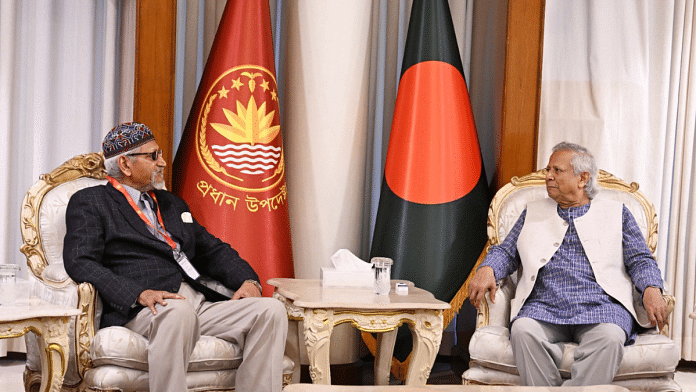SOURCE: AFI


The Bangladesh government has swiftly distanced itself from inflammatory remarks by Major General (Retd) ALM Fazlur Rahman, a former head of the Bangladesh Rifles (now Border Guard Bangladesh), who suggested that Bangladesh should occupy India’s seven northeastern states in the event of an Indian military retaliation against Pakistan following the April 22, 2025, Pahalgam terror attack that killed 26 people. The statement, posted on Rahman’s personal Facebook account on April 30, 2025, also proposed discussions with China for a joint military arrangement, escalating regional tensions already strained by the India-Pakistan standoff.
Rahman, currently the chairperson of the National Independent Commission investigating the 2009 Bangladesh Rifles mutiny, wrote in Bengali, “If India attacks Pakistan, Bangladesh should occupy the seven states of Northeastern India. In this regard, I think it is necessary to start a discussion on a joint military system with China.” The remarks, reported by The Tribune India, sparked immediate backlash in India, prompting Bangladesh’s Ministry of Foreign Affairs to issue a clarification on May 2, 2025, stating that Rahman’s views “do not reflect the position or policies of the government of Bangladesh” and that the government “neither endorses nor supports such rhetoric in any form or manner.”
The interim government, led by Chief Adviser Muhammad Yunus, emphasized its commitment to sovereignty, territorial integrity, mutual respect, and peaceful coexistence with all nations. Shafiqul Alam, press secretary to Yunus, reiterated that Rahman’s comments were made in a personal capacity and urged the public not to associate them with official policy. This response aims to mitigate diplomatic fallout at a time when India-Bangladesh relations are already strained, following the ouster of the Sheikh Hasina government in August 2024 and subsequent incidents of violence against minorities, particularly Hindus, in Bangladesh.
Rahman’s statement follows a pattern of provocative rhetoric from figures associated with Yunus’s interim government. In March 2025, Yunus himself stirred controversy during a visit to China, describing India’s northeastern states—Arunachal Pradesh, Assam, Meghalaya, Tripura, Mizoram, Manipur, and Nagaland—as landlocked and positioning Bangladesh as the “only guardian of the ocean” for the region. He suggested Bangladesh could serve as a trade corridor for China, remarks that drew sharp condemnation from Indian leaders across party lines. In response, India revoked a transshipment facility in April 2025, halting Bangladeshi exports through Indian ports and airports to third countries, except for Nepal and Bhutan, citing cargo congestion.
The timing of Rahman’s comments, amid heightened India-Pakistan tensions post-Pahalgam, has amplified their impact. India has accused Pakistan of orchestrating the attack, attributed to The Resistance Front (TRF), a Lashkar-e-Taiba proxy, and has implemented measures like suspending the Indus Waters Treaty and closing its airspace to Pakistani aircraft. Rahman’s suggestion of exploiting an India-Pakistan conflict to seize India’s Northeast, a region connected to the mainland via the narrow Siliguri Corridor, has raised concerns about Bangladesh’s strategic alignment, particularly with China. His call for a Sino-Bangladeshi military arrangement echoes Yunus’s earlier overtures to Beijing, fueling speculation about Bangladesh’s role in regional geopolitics.
Indian officials and analysts have dismissed Rahman’s remarks as “empty rhetoric” but view them as indicative of anti-India sentiment within certain Bangladeshi circles. External Affairs Minister S. Jaishankar, addressing the BIMSTEC foreign ministers’ meeting, countered Yunus’s narrative by highlighting the Northeast’s emergence as a connectivity hub with expanding road, rail, waterway, and pipeline networks, underscoring India’s “special responsibility” in the region. The Indian Army and security forces have intensified vigilance along the 1,600-kilometer India-Bangladesh border, particularly in the Northeast, to counter potential threats.
The controversy has also impacted India-Bangladesh bilateral ties beyond diplomacy. Reports suggest the Board of Control for Cricket in India (BCCI) is considering canceling the Indian cricket team’s scheduled tour to Bangladesh in August 2025 for three ODIs and three T20Is, with the Asia Cup T20 2025 also in jeopardy. This follows calls for a cricketing boycott of Pakistan due to the Pahalgam attack, reflecting growing public and political sentiment against engaging with nations perceived as hostile.
NOTE: AFI is a proud outsourced content creator partner of IDRW.ORG. All content created by AFI is the sole property of AFI and is protected by copyright. AFI takes copyright infringement seriously and will pursue all legal options available to protect its content.